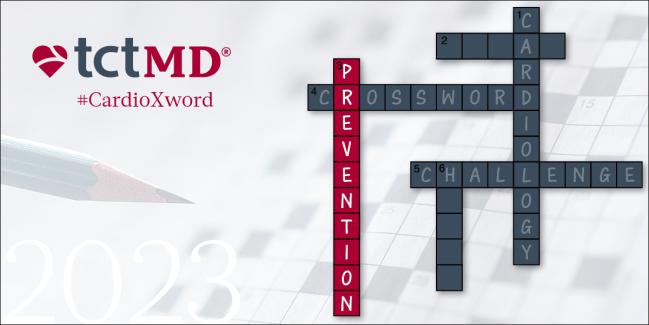Top General Cardiology and CVD Prevention News of 2023
Several new drugs have appeared on the scene, and a long-familiar anti-inflammatory splashed into the cardiology space.

Novel drugs and devices for established cardiovascular disease often make for banner headlines, but the field of primary prevention has been growing steadily over the years and 2023 was no different.
Excitement in the prevention space came in June with the US Food and Drug Administration’s approval of Lodoco (COLCHICINE; 2 Down*), sold by Agepha Pharma, as the first anti-inflammatory indicated for reducing cardiovascular events among adults who have established atherosclerotic cardiovascular disease (ASCVD) or are at risk of developing it. The decision was based on the 2020 LoDoCo2 randomized trial of more than more than 5,000 patients with chronic coronary disease.
Another ASCVD drug cardiologists have been paying attention to this year was bempedoic acid (10 Down), which proved its worth in the CLEAR Outcomes trial for lowering the risk of major adverse cardiovascular events in high-risk patients unable to tolerate statin therapy. Though physicians continue to debate how prevalent statin intolerance truly is, the additional data on this novel drug (Nexletol; Esperion) strengthens the case for its use.
Sweeping multiple top 10 lists, semaglutide (Wegovy; Novo Nordisk) became a cardiology buzzword in 2023. The glucagon-like peptide-1 (GLP; 29 Across) receptor agonist shone in multiple cardiovascular trials, with the full SELECT (34 Down) data presented at the American Heart Association (AHA) Scientific Sessions in November demonstrating that it reduces cardiovascular events in patients with overweight or obesity (BMI; 58 Across) and preexisting CVD who are not diabetic.
Also at AHA, the investigational long-acting, injectable PCSK9 inhibitor recaticimab (1 Across) made waves in the REMAIN-2 trial by more than halving LDL-cholesterol levels compared with placebo in patients already taking other lipid-lowering medications, with a dosing schedule of once every 3 months. The two other monoclonal antibodies that inhibit PCSK9 on the market are alirocumab (Praluent; Sanofi/Regeneron) and evolocumab (Repatha; Amgen), but those are dosed every 2 to 4 weeks. Availability of recaticimab (Jiangsu Hengrui Pharmaceuticals) could mean more compliance, although cost remains unknown.
The “power of zero,” referring to a coronary artery calcium of zero (ZEROCAC; 53 Across) was also strengthened by new data. Findings from the Multi-Ethnic Study of Atherosclerosis (MESA) supported the notion that elevated LDL cholesterol should not be concerning, or treated, for those with no CAC. Once patients have atherosclerosis, though, the study results suggest that lowering LDL should be a priority.
Finally, another question regarding LDL cholesterol was answered in the LODESTAR (7 Across) trial. Here, a treat-to-target approach was noninferior to the guideline-recommended high-intensity strategy in lowering MACE risk with statins. The trial, presented at the 2023 American College of Cardiology meeting, was the first to compare 3-year outcomes of these two treatment strategies, and its findings add more data to the ongoing discussions over which approach is better for reducing hard events.
What Else?
Speaking with TCTMD, Sadiya S. Khan, MD (Northwestern University Feinberg School of Medicine, Chicago, IL), pointed to a broad theme of 2023, namely that the year was rich with research that “helped to lift up prevention as a concept.”
Specifically, she said, the trials that focused on weight management as well as the broadly applicable PREVENT equations for disease prediction made it feel like there is a “bubbling to the surface of focus on prevention.”
In years past, there have been obvious specific therapies or drugs that capture the attention of those involved in clinical cardiology, according to Khan. While GLP-1 receptor agonists are not new, per se, the field of cardiology has truly embraced “their multipurpose and multiple indications, specifically as they were identified to have benefit in people with prevalent CVD.” Together, SELECT and the STEP-HFpEF trial made the role of these drugs clear in both the cardiovascular and the cardiovascular-kidney-metabolic (CKM) populations, she said.
Khan also highlighted the POP-HT trial, which showed that giving new mothers tools to self-monitor their blood pressure and speak remotely with their doctors for medication changes can lead to better BP control after a hypertensive pregnancy. “It really helps emphasize the importance of these interventions that begin in young adulthood,” she said, adding that cardiologists need to be “prioritizing young adulthood as a key period to measure, monitor, and modify risk.”
*All of our end of year stories for 2023 contain clues to our Cardiology Crossword Challenge.
Yael L. Maxwell is Senior Medical Journalist for TCTMD and Section Editor of TCTMD's Fellows Forum. She served as the inaugural…
Read Full Bio




Comments